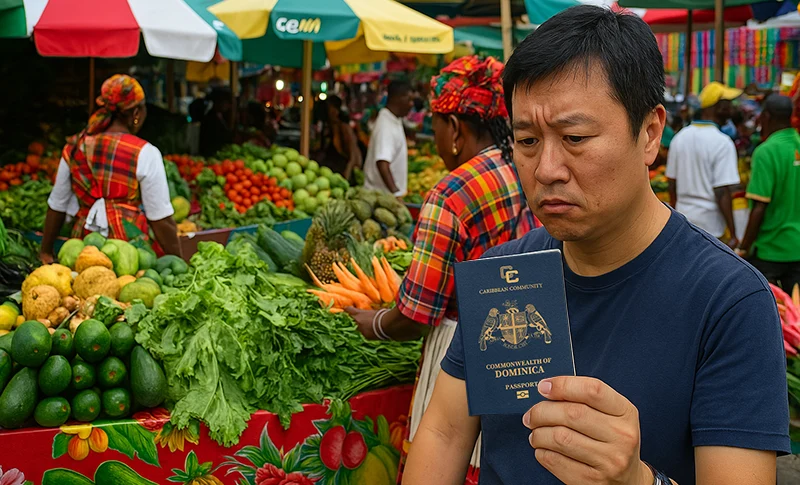Dominica Confronts Crisis as U.S. Tariffs and EU CBI Threats Collide

Dominica is staring down the barrel of a perfect economic storm. The United States’ imposition of a 10% tariff on imports from Caribbean countries, alongside looming European Union legislation that could upend Dominica’s Citizenship by Investment (CBI) program, has raised alarm bells across the island. For a country that manufactures little, imports almost everything—including food and bottled water—and is already wrestling with rising inflation and climate recovery costs, the consequences could be devastating.
U.S. Tariffs: A Sharp Blow to Imports and Livelihoods
The 10% tariff announced by the U.S. may appear moderate at first glance, but for Dominica, where nearly 36% of imports originate from American suppliers, the implications are far-reaching. In 2023, Dominica imported over US$265 million in goods, with an overwhelming majority going toward consumer goods, building materials, food, and pharmaceuticals. These are not luxuries—they are lifelines.
Retailers will almost certainly pass on the added costs to consumers, compounding already high food prices and squeezing low-income families. Dominica has no real manufacturing sector to soften the blow. Even basics like onions, garlic, and baby formula are brought in from overseas. For the average Dominican family, these increases won’t be measured in percentage points—they’ll be felt in skipped meals, delayed medication, and mounting anxiety.
Tourism on the Edge
Tourism remains one of the few bright spots in Dominica’s economy. In 2023, over 339,000 tourists visited the island—a 37% increase from the previous year. However, this fragile recovery could be at risk. Tour operators, hoteliers, and small business owners depend on affordable access to imported food, linens, cleaning supplies, and vehicle parts. Tariffs will raise operational costs, potentially making Dominica a less competitive destination in a region already crowded with tourism heavyweights.
Higher prices may push Dominica out of reach for eco-tourists and budget travelers. The island is known for its rustic charm, but charm alone can’t overcome affordability.
CBI Program Under Siege
Just as Dominica wrestles with the economic fallout of tariffs, another crisis is brewing. The European Union is finalizing legislation that could suspend visa-free access for countries running Citizenship by Investment programs. Dominica is front and center in that debate.
For years, the CBI program has been a lifeline for the island. It has funded post-hurricane reconstruction, public housing, airports, and even school repairs. But European lawmakers are increasingly worried that these programs could allow high-risk individuals to gain easy access to the Schengen zone. A recent report from the European Parliament’s LIBE committee advocates suspending visa waivers unless countries like Dominica significantly tighten their due diligence and application processes.
Should Dominica lose visa-free access to the EU, its CBI program will become far less attractive to global investors, especially those looking for mobility. The resulting revenue drop would be catastrophic. With limited exports and a modest tax base, Dominica cannot afford to lose this vital source of foreign exchange.
The Reality on the Ground
Dominica’s economy is already under strain. Food prices are rising, job opportunities remain limited, and natural disasters continue to take a toll on infrastructure. The new international pressures risk tipping the balance. Without manufacturing, with limited agricultural capacity, and with the threat of losing both major income streams—CBI and tourism—the island could face deep fiscal contraction.
How Dominica Can Respond
To navigate this perilous moment, Dominica must act swiftly and strategically. Some possible directions include:
- Accelerate Regional Diplomacy: Work with CARICOM to negotiate exemptions or adjustments to the U.S. tariffs. The bloc must present a united front.
- Redesign the CBI Program: Align due diligence standards with EU expectations. Increase transparency and perhaps limit applicants from high-risk countries to maintain EU trust.
- Ramp Up Local Production: It’s time to invest in small-scale food processing, rooftop agriculture, and community gardens. Reducing food import dependence is no longer optional.
- Target New Markets: Deepen trade and investment ties with Africa, Latin America, and Asia. Diversification is the only buffer against geopolitical turbulence.
- Double Down on Tourism Value: Maintain the island’s eco-tourism edge with quality experiences, not just quantity. Package Dominica as a high-value, low-volume destination worth the extra cost.
These are not simple fixes, but the island no longer has the luxury of delay.
Dominica stands on a precipice. The choices made now will determine whether the country can weather these global headwinds or be swept up in their force. For a nation already battling environmental threats and economic shocks, the path forward must be rooted in resilience, innovation, and realism.
This article is copyright © 2025 DOM767




